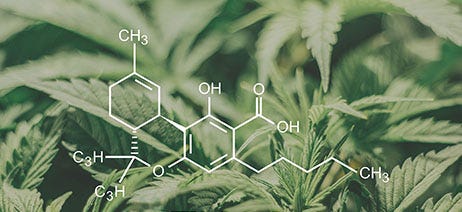Illinois residents may purchase up to 30 grams of flower/pre-rolls; up to 500 milligrams of THC-infused edibles; and up to 5 grams of concentrates. Non-residents may purchase up to 15 grams of flower/pre-rolls; up to 2.5 grams of concentrates; and up to 250 milligrams of THC-infused edibles.

THCA: What Is It & How Is It Different From THC?
THCA is the non-psychoactive precursor to THC. This cannabinoid is produced inside the cannabis plant, but it converts to THC when exposed to heat (e.g. lighting the flower). So, if you see THCA on the label, that means you’ll need to heat the product before consuming it.
Have you ever wondered why smoking cannabis produces psychoactive effects but eating raw flower does not? The answer lies in the difference between THCA and THC. Read on to learn more about:
- What is THCA & Where Does It Come From?
- THCA vs THC: Understanding the Differences
- How Do You Use THCA?
- How To Use THCA
- THCA Diamonds & Flower Explained
- Frequently Asked Questions
What is THCA & Where Does It Come From?
THCA stands for delta9-Tetrahydrocannabinolic acid, which is a chemist's way of saying that THCA is an acid and a precursor chemical to THC, the psychoactive compound in marijuana. It has a similar chemical structure to THC, but THCA is a larger molecule.1 Abundant in cannabis plants, THCA slowly converts into THC over time after the plants have been harvested. THCA turns into THC faster with the application of heat, which is why people smoke dried buds or vaporize them.2
THCA is similar to another cannabis compound, CBD, in that it's non-intoxicating, but it does have bioactive effects. Some potential benefits of THCA have been reported, including potential help for inflammation. The compound is being studied for potential neuroprotective, antioxidant, and anti-nausea benefits.2 Some people consider raw cannabis to be a "superfood," and part of this is the way that THCA seems to play a role in potential physical benefits.1
THCA vs THC: Understanding the Differences
The topic of THC vs THCA can cause quite a bit of confusion, especially when it comes to hemp-derived THCA. The explanation, though, is quite simple: raw cannabis flower contains THCA until you light it, and then it is converted into THC. Therefore, if you purchase a product that requires decarboxylation, the THCA will become THC.
Here’s a more scientific explanation around the differences of these two popular cannabinoids.1
Chemical Structures
THCA is a large molecule: too large to fit into cannabinoid receptors in the brain and central nervous system called CB1 receptors. When compared to THC, THCA has one more molecular carbolic ring, which makes it a misfit for CB1 receptors. In contrast, THC binds readily with these receptors, resulting in its psychoactive effects.1
Decarboxylation
THCA turns into THC through the application of heat and/or light which causes decarboxylation. Decarboxylation removes the extra carbolic ring found in THCA, turning it into THC. Although THCA doesn't fit our body's CB1 receptors, THC does, resulting in both psychoactive and bioactive effects.1
Decarboxylation can be accomplished through slow processes like exposure to sunlight and up to ten days of storage in oil or alcohol at room temperature. Smoking rapidly converts THCA to THC in cured, dried marijuana nugs, but it's not the most efficient method. Vaping, dabbing, and baking all convert the majority of THCA in cannabis buds to THC.1
Effects & Potency
On its own, THCA may offer a variety of bioactive effects, with consumers eating fresh, raw, and unheated cannabis through juicing or smoothies. Dried cannabis containing a high THCA content has the potential to produce the greatest amount of THC through decarboxylation.1
Frequently Asked Questions
THCA is a hot topic, so it’s natural to have questions. Here are a few common queries we get at our dispensaries.
Does THCA get you “high”?
THCA doesn't get people "high." Its molecular makeup means that it can't bind to the CB1 receptors in our brain and central nervous system which produce intoxicating effects.
Is Delta 8 the same as THCA?
No, THCA is the acid precursor chemical to THC, and CBD is a different cannabinoid.
Is THCA the same as CBD?
No, THCA is the acid precursor chemical to THC, and CBD is a different cannabinoid.
What's the difference between THCA vs Delta-9?
Both THCA and THC are Delta 9 cannabinoids, but THCA is an acid, the precursor to THC.
What's the difference between THCA vs THCV?
THCV (Tetrahydrocannabivarin) is a different cannabinoid, discovered in 1971. It has similar chemical properties and effects to THC, not THCA.3
Understanding THCA
If you're interested in learning more about THCA and discovering the effects it may have for you, your budtender can discuss different strains of cannabis flower and concentrates like diamonds. They will be happy to assist you to select THCA products when you visit your local dispensary.
Sources:
1. "THCA and THC: What's the difference?" June 20, 2022, https://weedmaps.com/learn/cannabis-and-your-body/difference-between-thca-thc
2. "What is THCA and what are the benefits of this cannabinoid?" Leafly, September 16, 2022, https://www.leafly.com/news/cannabis-101/what-is-thca-and-what-are-the-benefits-of-this-cannabinoid
3. "THCA," Leafly, https://www.leafly.com/learn/cannabis-glossary/thca


